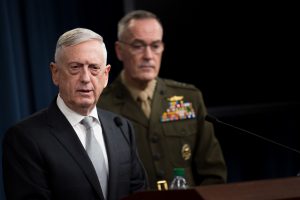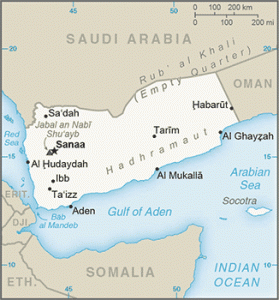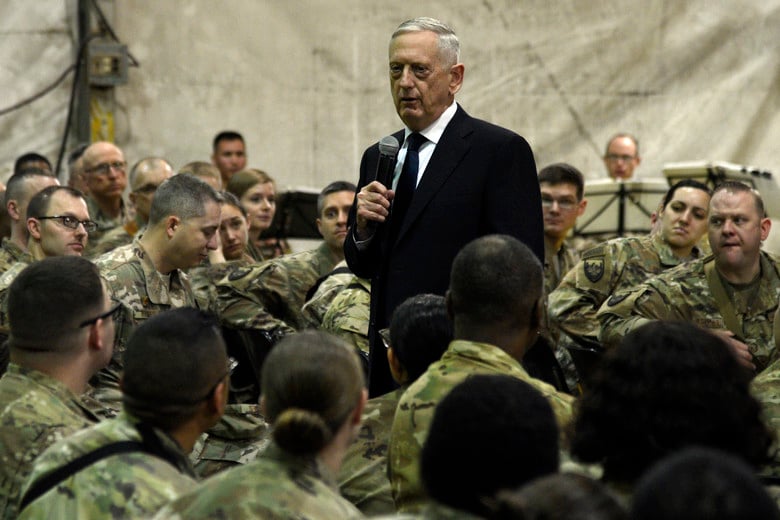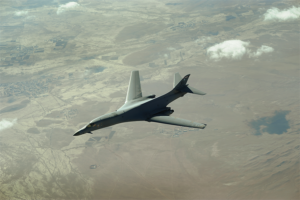Mattis Supports Saudi War in Yemen, Rejects Privatizing Afghan Fight
Posted on
PENTAGON: Under growing pressure from human rights groups and the United Nations, Defense Secretary James Mattis said Tuesday that Washington’s support for the Saudi-led coalition fighting in Yemen is “not unconditional,” following several high-profile attacks by Saudi jets that left dozens of civilians dead, including children.
Mattis didn’t offer any indication what conditions would have to be met, however, for the US to turn off the spigot of arms sales, training, intelligence and operational support which allows Saudi and Emirati jets to continue their assaults against Houthi rebels in the war-ravaged country.

Secretary of Defense Jim Mattis and the Chairman of the Joint Chiefs of Staff, Gen. Joseph Dunford, brief the press
“We reviewed the support for the Arab Coalition when we came into office,” Mattis told reporters during a rare and wide-ranging appearance in the Pentagon briefing room alongside Joint Chiefs chairman Gen. Joseph Dunford. “We determined that it was the right thing to do to support them in the defense of their own countries, but also to restore the rightful government there.”
American military officials have stressed for years that US aircraft don’t conduct missions over Yemen targeting Houthi fighters, and US service members aren’t involved in picking out targets for coalition pilots to hit. But the full level of support — which includes aerial refueling of Saudi and Emirati jets — has always been murky, with some officials insisting that the U.S. is merely advising coalition pilots in how to avoid civilian casualties. Mattis today specifically said the US has provided “training” to Saudi forces.
“In Yemen, as a general statement, we stay out of the war ourselves,” Mattis said. “For the last several years we have been working with the Saudis and the Emiratis doing what we can to reduce any chance of innocent people being injured or killed.”
“The training we have given them we know has paid off,” Mattis continued. “We have had pilots in the air who recognize the danger of a specific mission and declined to drop even when they get the authority. We have seen staff procedures that put no-fire areas around areas where there’s hospitals or schools.”
That said, “we are watching a war in which the Houthi-led effort involves launching weapons out of residential areas into Saudi Arabia,” raising the risk of civilian casualties, Mattis said. “Every mistake like this is tragic in every way, but we have not seen any callous disregard from the people we’re working with.”
 How bad is it in Yemen? A report for the UN Human Rights Council released Tuesday holds that the governments of Yemen, the UAE and Saudi Arabia — as well as the Houthi rebels — are likely responsible for war crimes including rape, torture, using child soldiers and bombing civilian targets.
How bad is it in Yemen? A report for the UN Human Rights Council released Tuesday holds that the governments of Yemen, the UAE and Saudi Arabia — as well as the Houthi rebels — are likely responsible for war crimes including rape, torture, using child soldiers and bombing civilian targets.
Since 2014, the fighting has killed at least 6,475 civilians, the report said, while acknowledging the actual figure is almost certainly significantly higher.
Earlier this month, the Saudi-led coalition bombed a school bus in northern Yemen, killing dozens of children. CNN has reported that the weapon used was a 500-pound laser-guided MK 82 bomb made by Lockheed Martin, the world’s largest defense contractor, sold to the Saudis with the full approval of Congress and the White House. The Obama administration had banned the sale of precision-guided weapons to Saudi Arabia over human rights concerns brought about by air strikes on markets, homes, and gatherings of innocent people. The ban was overturned by the Trump administration’s then-Secretary of State Rex Tillerson in March 2017.
Afghanistan
Mattis and Dunford were also blunt about the US mission in Afghanistan, which will enter its 17th year in October. Mattis rejected the idea of sending military contractors to replace soldiers.
“When the Americans put their nation’s credibility on the line, privatizing it is probably not a wise idea,” Mattis said. There have been reports that Blackwater founder Erik Prince has pitched the Trump administration on replacing U.S. troops with contractors. The Pentagon has long rejected the idea.
While Afghan forces are doing the majority of fighting on the ground, the U.S.-led air war is reaching new levels of activity as the Taliban and ISIS continue to pound the Afghan army and police outposts.
Through July, the U.S. has dropped more than 3,700 bombs in Afghanistan, a number that will likely top the 4,300 dropped in 2017, which is the most active year for U.S. pilots since 2012, according to numbers released by the U.S. Air Force. US airstrikes and special operations troops, some of whom were wounded, provided vital support to Afghan commandos retaking Ghazni atter that strategically located city was largely overrun.
Mattis rejected the idea that the Afghan police and army garrisons in the city had collapsed. “I would not say they ‘fell apart,'” he rebuffed one reporter, “because there were six military objectives in Ghazni. They (the Taliban) did not achieve a single one.” The insurgents couldn’t take heavily defended positions, he argued. The could only “go in and shoot up the residential neighborhoods and chase the police out.”
Afghan security forces have kept fighting despite heavy casualties, Mattis said. The Taliban rank-and-file are reportedly pressuring their leaders towards a ceasefire.
“A year ago, if we’d said there’ll be a ceasefire sometime during the next year, we’d have had a very hard time convincing you of that,” Mattis said. Now we’ve actually had one, this June during the Eid holidays, and “another one’s being proffered.”
Afghanistan has been continuously at war since 1979, when a Soviet invasion ended decades of relative peace and broke the central government so badly that no one has been able to pacify warring factions since, let alone unite them.
Subscribe to our newsletter
Promotions, new products and sales. Directly to your inbox.



